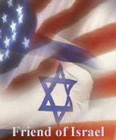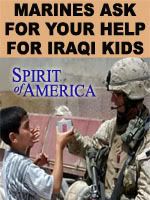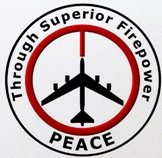...is a US Army officer. He has just got back from Iraq, and my friend invited me to join him and his brother for lunch last Thursday. I am going to try to re-cap what I've learned.
My friend introduced me by saying: "Eric counters the leftist demonstrations", to which his brother replied with a question: "Protest Warrior?" Needless to say, I was pleased that he knew about us. My friend's brother was in Ramadi. I asked him about the attitude of the locals toward Americans. He replied that initially, when his unit just got there, everybody hated them, but now it is different. It's not really surprising: after all, Ramadi is in the Sunni Triangle. But then, they started fixing infrastructure, providing security and generally improving people's lives, while relentlessly pursuing the bad guys, and things started to change. Now things are relatively quiet. The local police are very effective. They are former insurgents for the most part, but, as he put it, "they are joining the winning team". In contrast, the Iraqi army units in Ramadi are not very effective: they are mostly Shias from the South and are not trusted by the locals. We asked if there was a lot of fighting. He said that initially it was pretty bad: the insurgents were mounting coordinated attacks daily, in several places around the city, in large numbers attacking fixed American positions. To some extent it must have made thing easier: it was essentially conventional warfare. It does not happen any longer. The insurgents might take pot shots at our guys, but that's about it. The locals inform on them: they are tired of fighting. And, as I've said before, many insurgents switch sides and join the police. People are still afraid to show too much friendliness toward our guys: "Al Qaeda in Iraq" is still there. But the locals do cooperate with the authorities. We asked whether the insurgents were locals or foreigners for the most part. He said that the insurgents were mostly locals, but the suicide bombers are mostly foreigners from all over the Muslim world. Out of curiosity I asked whether there were any Chechens fighting our guys. He said that he hasn't seen any, but he heard of them. He also said that some formerly hot places like Tal Afar are completely pacified, while Ramadi is almost pacified. We asked what our guys do if somebody starts shooting at them from some building. He said that usually our guys shoot back and call for a couple of tanks. If the bad guys are still shooting by the time the tanks arrive, the tanks eliminate them. If after a couple of shots from tank cannon the bad guys are still there, they call for an air strike. I asked if the bad guys hide behind the civilians. He said that they perhaps would, but the buildings used by the bad guys are all empty: the locals don't want to be there and simply abandon those places. I asked him whether General Petraeus, the new commander in Iraq, is any good. He said that while he does not know personally, he's heard good things about him. However, he did mentioned that Petraeus has a bit of MacArthur complex: he always has a bunch of reporters following him. I replied to it that MacArthur did get a job done. Besides, some good PR would not hurt right now.
Here is the bottom line that I got out of it. The new tactics is basically creating a sharp contrast: cooperate with or at least do not resist the authorities, and your life will be really nice. Join the insurgency, and you won't have a life. And this is working, as it should. People for the most part do not want to fight anybody. They just want to be left alone. Whoever gives the people a chance at peaceful life will ultimately win. Thus, they will not be on our side if we just abandon them to "Al Qaeda in Iraq". We just need to be patient. Any artificial deadline will preclude us from succeeding: why would anybody join us knowing that we will just leave by a certain date? We will go home, but the locals will have to live there. So, their survival requires them to be on the other side. That is why we cannot leave by any deadline. Furthermore, we will need bases there. Just like we kept bases in Germany in order to confront the Soviets, we will bases in Iraq to project power against the crazy mullahs in Iran.
Powered by Qumana

















No comments:
Post a Comment